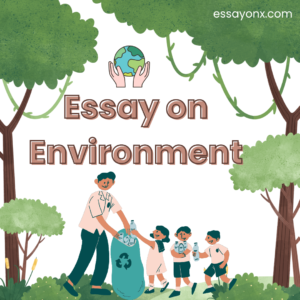Essay on Environmental Consciousness: Nurturing Our Planet for Future Generations: In this essay, we explore the significance of environmental consciousness and the urgent need to foster a collective commitment towards environmental stewardship.
Introduction:
In an era marked by rapid industrialization, urbanization, and technological advancement, environmental consciousness has emerged as a critical imperative for safeguarding the health and sustainability of our planet.
Understanding Environmental Consciousness:
Environmental consciousness refers to the awareness, sensitivity, and responsibility towards the natural environment and its ecosystems. It encompasses a deep understanding of the interconnectedness of all living beings and their dependence on a healthy and balanced environment for survival and well-being. Environmental consciousness involves recognizing the impact of human activities on the environment and taking proactive measures to mitigate negative consequences.

Challenges Facing the Environment:
The environment faces numerous threats, including climate change, deforestation, pollution, loss of biodiversity, and depletion of natural resources. These challenges are exacerbated by unsustainable consumption patterns, overexploitation of resources, and disregard for environmental sustainability. Climate change, in particular, poses an existential threat, with rising temperatures, extreme weather events, and sea-level rise threatening ecosystems, biodiversity, and human livelihoods.
The Importance of Environmental Consciousness:
Environmental consciousness is crucial for addressing these challenges and promoting sustainable development. It fosters a sense of responsibility and stewardship towards the environment, encouraging individuals, communities, businesses, and governments to adopt eco-friendly practices and policies. By raising awareness about environmental issues, educating the public about the importance of conservation, and promoting sustainable lifestyles, environmental consciousness can inspire collective action towards building a more resilient and sustainable future.
Promoting Sustainable Practices:
Environmental consciousness entails adopting sustainable practices that minimize environmental impact and promote resource conservation. This includes reducing waste, conserving energy and water, promoting renewable energy sources, practicing sustainable agriculture, and protecting natural habitats. Sustainable practices not only benefit the environment but also contribute to economic prosperity, social equity, and human well-being.
Role of Education and Awareness:
Education and awareness play a crucial role in fostering environmental consciousness. By integrating environmental education into school curricula, raising awareness through public campaigns, and promoting eco-friendly initiatives, we can empower individuals to make informed choices and take action to protect the environment. Environmental education instills values of respect, responsibility, and empathy towards nature, nurturing a sense of environmental citizenship and stewardship.
Global Cooperation and Collective Action:
Addressing environmental challenges requires global cooperation and collective action. International agreements, such as the Paris Agreement on climate change and the Convention on Biological Diversity, provide frameworks for countries to work together towards common environmental goals. By collaborating on research, sharing best practices, and mobilizing resources, the global community can accelerate progress towards a sustainable and resilient future for all.
Conclusion:
Environmental consciousness is not just a moral imperative; it is essential for the survival and well-being of present and future generations. By nurturing a deeper understanding of our interconnectedness with the natural world and embracing sustainable practices, we can protect and preserve the environment for the benefit of all life on Earth. As stewards of the planet, it is our collective responsibility to cultivate environmental consciousness, inspire action, and work towards building a more sustainable and harmonious relationship with nature.
